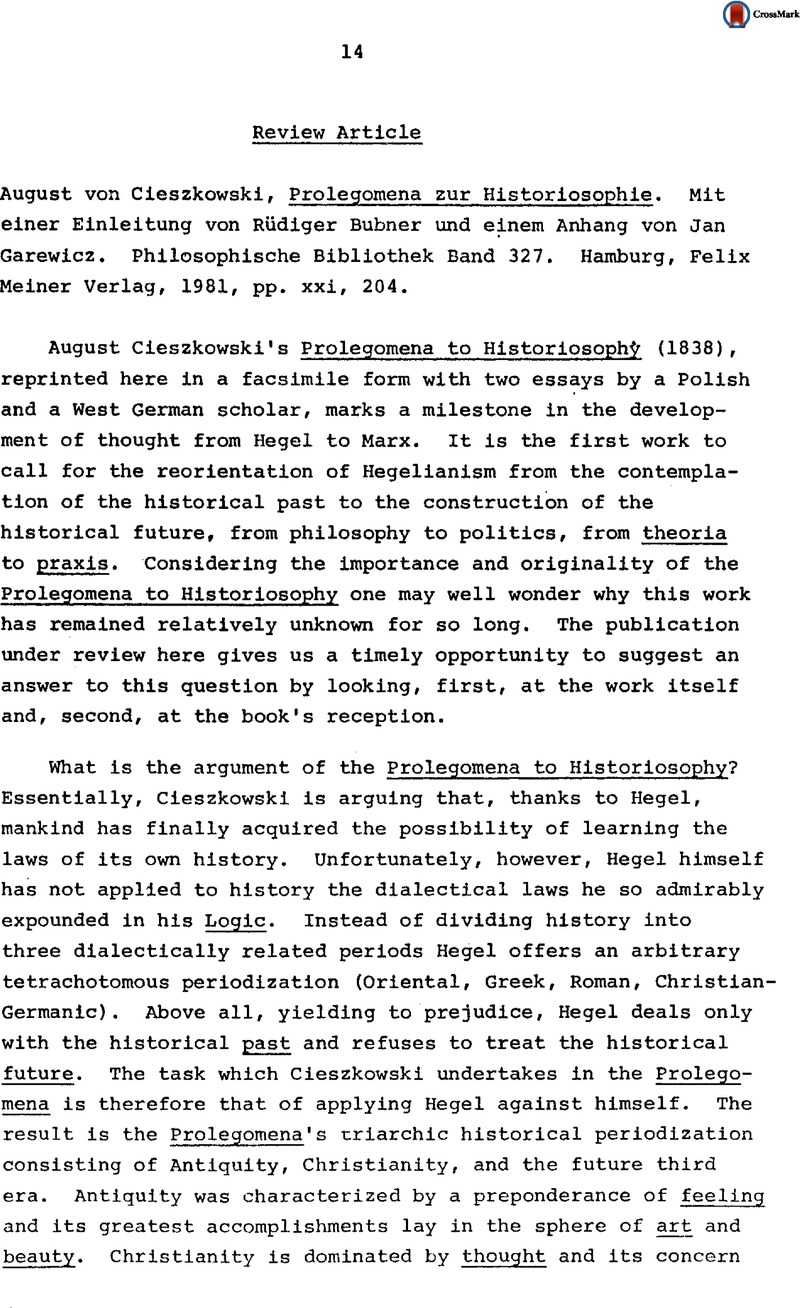No CrossRef data available.
Published online by Cambridge University Press: 23 June 2015

1. For materials related particularly to the Prolegomena to Historiosophy and Cieszkowski's other German language works see Kühne, Walter, Graf August Cieszkowski, ein Schüler Hegels und des deutschen Geistes: Ein Beitrag zur Geschichte des deutschen Geisteseinflusses auf die Polen, Veröffentlichungen des Slavischen Instituts an der Friedrich Wilhelm Universität, Berlin, vol. XX (Leipzig, O. Harrassowitz, 1938)Google Scholar. For a monographic account of Cieszkowski's life and writings see Liebich, André, Between Ideology and Utopia: The Politics and Philosophy of August Cieszkowski, Sovietica XXXIX, (Dordrecht-Boston-London, Reidel, 1979)CrossRefGoogle Scholar.
2. See Garewicz, Jan, ‘August Cieszkowski w oczach niemców w latach trzydziestych i czterdziestych XIX-go wieku’, Polskie Spory o Hegla, edited by the Instytut Filozofii i Socjologii Polskiej Akademii Nauk (Warsaw, 1966), pp. 205–243 Google Scholar.
3. See Walicki's, Andrzej seminal article ‘Francuskie inspiracje myśli filozoficzno-religijnej August Cieszkowskiego’, Archiwum Historii Filozofii i Mysli Społecznej, XVI (1970), pp.127–171 Google Scholar.
4. See: Silberner, Edmund, Moses Hess: Geschichte seines Lebens (Leiden, Brill, 1966), pp.68–72 Google Scholar; Zaleski, Z., ‘Edgar Quinet et Auguste Cieszkowski’, ‘Melanges d'histoire littéraire et générale offerts à Fernand Baldensperger, vol. II (Paris, Champion, 1930), pp.361–374 Google Scholar; Chyzhevsky, Dmitry ‘Hegel in Russland’, Hegel bei den Slaven, 2nd ed. (Bad Homburg, Gentner, 1961), pp.210–212 Google Scholar; Walicki, Andrzej, ‘Cieszkowski a Hercen’, Polskie Spory o Hegla, pp.153–205 Google Scholar.
5. For a fuller statement of this argument see André Liebich, ‘Prolégomènes à une théorie de la praxis’. Economies et Sociétés, cahiers de l'I.S.E.A., VIII, 10 (1974), (séries S, no. 17), pp.1487-1506.
6. Cieszkowski, August, Gott und Palingenesie: Erster Kritischer Teil. Erstes Kritisches Sendscreiben an den Herrn Profesor Michelet auf Veranlassung seiner Vorlesungen über die Persönlichkelt Gottes und die Unsterblichkeit der Seele (Berlin, E.H. Schroder, 1842)Google Scholar.
7. Lukács, Gyorgy, ‘Moses Hess und die Probleme der idealistischen Dialektik’, Archiv für die Geschichte des Sozialismus und der Arbeiterbewegung, XII (1926), pp.103–155 Google Scholar; Cornu, Auguste, Moses Hess et la gauche hégélienne (Paris, Presses universitaires de France, 1934), pp.45ffGoogle Scholar. and Karl Marx et Friedrich Engels, vol. I: Les années d'enfance et de jeunesse. La gauche hégélienne, 1818/1820–1844 (Paris, Presses universitaires de France, 1955), pp.139–142 Google Scholar; Ellenstein, Jean, Marx: sa vie, son oeuvre (Paris, Fayard, 1981), pp.40–41 Google Scholar.
8. Avineri, Shlomo, The Social and Political Thought of Karl Marx (Cambridge, Cambridge University Press, 1968), pp.124–131 CrossRefGoogle Scholar; McLellan, David, The Young Hegelians and Karl Marx (London, Macmillan, 1969), pp.4–7 CrossRefGoogle Scholar; Kolakowski, Leszek, Main Currents of Marxism, vol. I (Oxford, Oxford University Press, 1979), pp.85–88 Google Scholar.
9. See Marx's letter to Engels, 12 January 1882, and Engels' reply to Marx, where he calls the Prolegomena a ‘natur-philosophisch-botanisches Buch’ (1), Marx-Engels Werke, vol. XXXV (Berlin, Dietz Verlag, 1973), pp. 35 and 37 Google Scholar.
10. Gebhardt, Jurgen, ‘Der Übergang von der akademischen Schulezur politischen Bewegung’, Politik end Eschatologie: Studien zur Geschichte der Hegelschen Schule in den Jahren 1830-1840, Münchener Studien zur Politik I (Munich, Beck, 1963), pp.130–152 Google Scholar; Stuke, Horst, ‘August Cieszkowski und die Begründurtg der Philosophie der Tat im absoluten Spiritualismus’, Philosophie der Tat: Studien zur ‘Verwlrklichung der Philosophie’ bei den Junghegelianern und den Wahren Sozialisten, Industrielle Welt III (Stuttgart, E. Klett, 1963), pp.83–122 Google Scholar; Lobkowicz, Nicholas, ‘Absolute knowledgeand praxis: Cieszkowski’, Theory and Practice: History of a Concept from Aristotle to Marx (Notre Dame and London, University of Notre Dame Press, 1967), pp.193–204 Google Scholar; Walicki, Andrzej, ‘August Cieszkowski's philosophical works of 1838-1842 within the intellectual context of their times’, Dialectics and Humanism, III (1975), pp.197–209 CrossRefGoogle Scholar; Stepelevich, Lawrence S., ‘August von Cieszkowski: from Theory to Practice’, History and Theory, XIII, 1 (1974), pp.39–53 CrossRefGoogle Scholar. The first work to consider Cieszkowski in this way had already been Löwith's, Karl Von Hegel zu Nietzsche: der revolutionäre Bruch im Denken des neunzehnten Jahrhunderts (Zürich, Europa Verlag, 1941)Google Scholar.
11. The first facsimile edition: Prolegomena zur Historiosophie (Nendeln/Liechtenstein, Kraus, 1976)Google Scholar. The French translation: Prolégomènes à l'historiosophie (Paris, Editions Champ Libre, 1973)Google Scholar. Selected Writings of August Cieszkowski, edited and translated with an introductory essay by Liebich, André (Cambridge, Cambridge University Press, 1979)Google Scholar contains the first English translation of slightly more than half the work. The more recent Polish translation with notes: Prolegomena do Historiozofii, Bóg i Palingeneza, oraz mniejsze pisma filozoficzne z lat 1838-1842, edited by Garewicz, Jan and Walicki, Andrzej, (Warsaw, Państwowe Wydawnictwo Naukowe, 1972)Google Scholar.
12. The last and most complete edition of the Our Father was the second Polish edition: Ojcze Nasz, vols. I-III (Poznan, Fiszer i Majewski, 1922-1923). The rare French translation: Notre Père, vol. I translated by Gasztowtt, W. and Cieszkowski, A. Jr. (Paris, Société francaise d'Imprimerie et Librairie, 1906), vol. II–IV translated by Cazin, Paul and Cieszkowski, A. Jr., (1927–1929)Google Scholar. The abridged English translation: The Desire of All Nations, translated by Rose, William J. (London, Student Christian Movement, 1919)Google Scholar.